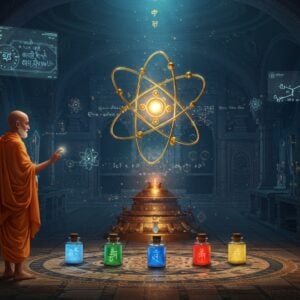
Namaste! As you prepare for the UGC NET 2025 exam, you might find yourself facing a subject that feels both new and ancient: Indian Logic. Don’t worry, you are not alone. This is not just another topic to memorise; it’s a journey into the heart of our own heritage. Known as Bharatiya Nyaya Shastra, this is the system of reasoning our ancestors perfected over centuries. It’s a beautiful way to train your mind, find clarity, and yes, score well in your exam!
Think of it as learning the secret language of logic that flows in our cultural veins. It’s different from Western logic, offering a perspective that is deeply rooted in our own philosophy and way of life.
The Roots of Indian Reasoning: Where Did It All Begin?
Our tradition of deep thinking and debate is ancient. Great philosophical schools like Nyaya, Vaisheshika, and Mimamsa were the crucibles where these ideas were forged. Sages like Akshapada Gautama gave us foundational texts like the Nyaya Sutras, which are not just books but manuals for clear thinking. They teach us how to arrive at the truth through proper reasoning (Tarka) and valid knowledge (Pramana). To get a broader perspective on our rich intellectual heritage, you might find our Beginner’s Guide to Hindu Philosophy very helpful.

The Pillars of Knowledge: Understanding the Pramanas
So, how do we know what we know is true? Our ancestors gave this a lot of thought and came up with the concept of Pramanas, or the valid means of knowledge. Think of them as the six gateways through which truth can enter our minds. For your UGC NET exam, understanding these is absolutely essential.
- Pratyaksha (Perception): This is the most direct way of knowing. It’s the knowledge you get straight from your senses – seeing the sun, hearing a temple bell, feeling the warmth of a diya. It’s immediate, undeniable, and the foundation of all other knowledge.
- Anumana (Inference): This is the magic of logical deduction. You see smoke rising from a hill (the reason or Hetu) and you conclude that there must be a fire (the proposition or Sadhya). This is Anumana. It’s about connecting what you see to what you know to be true.
- Upamana (Comparison or Analogy): This is how we learn by comparing. If someone tells you a wild cow looks like a domestic cow but is more robust, you use your existing knowledge of a cow to understand something new. It’s learning through familiar examples.
- Shabda (Verbal Testimony): This is knowledge that comes from a trustworthy source. When we listen to the teachings of our Gurus, read the Vedas, or accept the words of a reliable expert, we are using Shabda Pramana. It’s about having faith in authentic words.
- Arthapatti (Implication or Postulation): This is a fascinating one! It’s about understanding something that isn’t directly said but is clearly implied. If you know someone fasts during the day but is still healthy, you can imply that they must be eating at night. You arrive at the truth by figuring out the missing piece of the puzzle.
- Anupalabdhi (Non-apprehension): How do you know there is no elephant in your room? Because you don’t see one! This is knowledge from absence. It’s the understanding that something does not exist simply because it is not perceived where it should be.
The Art of Inference: A Closer Look at Anumana
A big part of your exam will focus on Anumana, or inference, because it is the core of logical reasoning. Every inference has a structure. The unbreakable bond between the reason (Hetu, the smoke) and what you are trying to prove (Sadhya, the fire) is called Vyapti. This universal, inseparable relationship is the soul of a valid inference. Understanding this structure helps you build strong arguments and easily spot flawed ones.
And speaking of flawed arguments, you must also learn about Hetvabhasas. These are the fallacies of inference – common mistakes in reasoning that lead to wrong conclusions. Think of them as logical traps. Learning to identify them is like having a shield to protect your arguments from error.
Creating the Right Atmosphere for Study
Studying these deep concepts requires focus and a calm mind. Creating a dedicated, serene space for your studies can make a world of difference. Lighting a gentle sandalwood incense stick can help purify the space and improve concentration.
When you sit down with your books, treating them with respect also enhances the learning process. Many students find that using a traditional book stand helps maintain posture and focus. We have a selection of simple yet elegant options like this holy book stand (Rehal) that can make your long study sessions more comfortable.

Your Common Doubts on Indian Logic Addressed
Many aspirants preparing for the UGC NET exam often wonder why this ancient subject is so important today. Well, Indian Logic is the key to sharpening your critical thinking and analytical skills, which are vital for any academic career. It’s not just about philosophy; its principles enhance your ability to construct sound arguments and deconstruct weak ones in any field.
To begin your study, it’s best to start with the foundational concepts of the Nyaya school of philosophy. Focus on truly understanding the Pramanas first, as they are the building blocks. Once you are comfortable, move on to the structure of Anumana and the different types of Hetvabhasas. Practicing with previous years’ question papers is the best way to test your understanding. While there are many excellent books, it’s the consistent application of these concepts that will bring you success.
Remember, this study is more than just exam preparation. The theory of knowledge in our tradition, or epistemology, is seen as a means of liberation. By training your mind to see clearly and think logically, you are walking a path that leads not just to a good score, but to ultimate spiritual liberation, or Moksha.
Embracing This Timeless Wisdom
As you delve into Bharatiya Nyaya Shastra for your UGC NET 2025 preparation, see it as a gift from our ancestors. It is a powerful tool for the mind and a balm for the spirit. Embrace it with an open heart, practice with dedication, and let this ancient wisdom guide you to success.
For any authentic pooja items or educational materials to support your spiritual and academic journey, remember that poojn.in is always here to help. We are just a call away at 03369029784 or on WhatsApp at 9476142738. Best of luck with your preparation!


